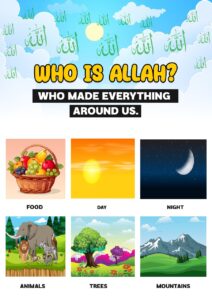Answers for Teacher or Parents: 4 Years Old & Up

Wise and Powerful: He is most wise and powerful, able to do things we can’t even imagine.
Kind and Merciful: Allah is kind and most merciful, always ready to forgive and help us.
Our Best Friend: Explain that Allah is our best friend who is always there for us, even when others might not be.
Listens to Us: Allah listens to us when we talk to Him in our prayers and Dua , just like a caring friend listens when we speak.
Invisible Friend: Tell them that even though we can’t see Allah, He is always with us, like an invisible friend.
Giver of Gifts: Allah gives us many gifts, like parents relatives, friends tasty foods, yummy fruits, and variety of drinks.
In the Quran: Mention that Allah’s words are in a special book called the Quran, which guides us on how to live a good trouble free life.
Watches Over Us: Allah watches over us like a more than loving parent, making sure we are safe and happy.
The One and Only: Help them understand that Allah is the one and only God, and there is no one else like Him.
Teaches Us Right and Wrong: Allah teaches us what is right and wrong through Quran and His last. Prophet so we can be good and kind to others.
Creator of Animals: Share that Allah created all the animals, big and small, lions rabbits, birds fishes with love and care.
Gives us Families: Explain that our parents families friends are a special gift from Allah, and He wants us to love and care for each other.
In Control of Everything: Allah is in control of everything, like the weather, Falls Spring Summer winter, rain, thunder, snow winds trees, and the oceans.
Hears Our Secrets: Let them know that Allah hears our secrets and knows what is in our hearts.
Forgives Mistakes: Allah forgives us when we make mistakes such as lying cheating stealing and fighting
and mistakes teaching helps us learn from them.and ask forgiveness from Allah.
Our Guide: Explain that Allah is like a guide, showing us the right path in trouble free life.
In the Sky: Tell them that Allah is above the sky, looking down on us with love.
Creator of Colors: Mention that Allah created all the beautiful colors we see in flowers, butterflies, rainbows and the sky
Always Loves Us: Lastly, emphasize that Allah always loves us, no matter what, and His love is the most special of all.
Q. Who is ALLAH and Who is God?
Nowadays, Muslims refer to God as Allah. It’s important to note that non-Muslims also use the term ‘God’ to refer to Allah. The name Allah is an unchanging identity; just as you wouldn’t call your friend Ali by the name David and expect a response, we cannot call Allah by any other name, and He won’t respond.
Is it wrong to call Allah ‘God’? Yes. You cannot attribute titles to Allah that are reserved for those who follow Him, without associating partners. In Islam, ignorant people may refer to humans like Jesus, Buddha, etc., as gods. Calling anyone other than Allah as God is considered a great sin, as mentioned in Quran Chapter 7, Verse 180. Those who do not call Allah by His designated names, as outlined in the Quran, will face punishment.
Q. Where is ALLAH?
In Our Hearts: Explain that Allah is close to us, residing in our hearts with love and kindness.
Everywhere Around Us: Share that Allah total controls is everything and everywhere, in the sky, trees, and the air we breathe.
In the Mosque: Teach that we go to the mosque to feel closer to Allah and worship together.
In the Quran: Explain that Allah’s words are in the Quran, and reading it helps us connect with Him.
In the Sky: Tell them that Allah is above the sky, watching over us like a caring guardian.
In Our Prayers: Emphasize that when we pray, we are communicating with Allah, and He listens to our words.
In the Stars and Moon: Mention that Allah created the stars and the moon, and His presence is reflected in the beauty of the night sky.
In Acts of Kindness: Share that when we are kind and helpful, we are following Allah’s teachings, and He is present in our good actions.
In the Sun: Explain that Allah created the sun, providing warmth and light to the world.
In Our Thoughts: Remind them that Allah knows our thoughts and understands what is in our hearts.
In Our Dreams: Assure them that Allah is with us even in our dreams, guiding and protecting us.
In Nature: Explore how Allah’s creations, like flowers, animals, and rivers, surround us, showcasing His divine presence.
In Loving Families: Highlight that Allah is present in the love shared among family members.
In Learning: Explain that when we learn new things, we are appreciating the knowledge Allah has given us.
In Acts of Generosity: Teach that when we share and help others, we are embodying Allah’s generosity.
In Forgiveness: Emphasize that Allah forgives us when we make mistakes, such as lying, cheating, backbiting fighting and His mercy is always with us.
In Silence: Explain that sometimes, we feel Allah’s presence in quiet moments of reflection and gratitude.
In Rain and Thunderstorms: Share that Allah controls the weather, and elements like rain Snow and thunder remind us of His power.
In Food: Express gratitude for the food we have, as it comes from Allah’s provisions.
In the Promise of Tomorrow: Convey the idea that Allah is with us every day, guiding us through life’s journey.
Q. Why I Cannot See Allah
Invisible Presence: Explain that Allah is not like things we can see, but His presence is felt in our hearts and surroundings.
Special Connection: Share that we connect with Allah through our prayers and good actions, even though we can’t see Him.
Different from Everyday Things: Clarify that Allah is not like toys or people; He is unique and beyond our normal understanding.
A Test of Faith: Teach that believing in Allah without seeing Him is a test of our faith, like believing in the wind even though we can’t see it.
Spiritual Understanding: Introduce the concept that Allah is a spiritual being, and we use our hearts and feelings to understand His presence.
Beyond Our Sight: Explain that Allah is beyond what our eyes can see, unlike the things in our daily life.
In the Unseen World: Share that Allah exists in a world that we can’t see, a world of the unseen.
Like Love and Happiness: Compare Allah’s presence to emotions like love and happiness, which we can’t see but can feel.
In the Sky and Beyond: Express that Allah is above the sky and beyond the reach of our eyes.
Mystery and Wonder: Discuss that Allah is a wonderful mystery, and some things are meant to be understood with our hearts.
Faithful Belief: Emphasize that having faith means believing in Allah even when we can’t see Him.
Guidance Through Signs: Explain that Allah guides us through signs in nature, like the sun, moon, and stars.
Hidden from Human Eyes: Share that Allah’s greatness is hidden from human eyes, and our minds may not fully comprehend Him.
In the Quran’s Words: Point out that the Quran tells us about Allah, and reading it helps us understand His wisdom.
Invisible Friend: Introduce the idea that Allah is like an invisible friend, always with us, even if we can’t see Him.
Trust and Patience: Teach that trusting in Allah and being patient are important, even when we can’t see Him.
Respecting Allah’s Nature: Explain that Allah’s nature is different from the things we see, and we show respect by understanding this difference.
Believing in Miracles: Share stories about miracles and explain that sometimes Allah’s actions are extraordinary and beyond our sight.
Understanding with the Heart: Encourage them to use their hearts to understand Allah, as the heart can see things that the eyes cannot.
A Beautiful Mystery: Convey that Allah’s invisibility adds to His beauty, and it’s a part of the wonderful mystery of faith.
